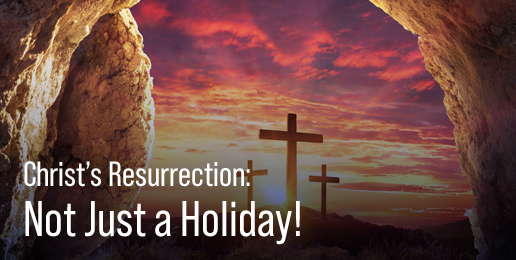
It is quite unfortunate that the most important date on the Christian calendar is misnamed! While of uncertain origin, the best guesses are that the title “Easter” is derived from a pagan religion, but that is a subject for another time.
My point is, however, that the name gives no indication of the reason for the holiday in the first place, which is to celebrate the resurrection of Jesus Christ. Most Americans see the date as a time for easter egg hunts or to enjoy Spring.
I would like to suggest that if you have not considered the real reason why Christians celebrate Easter, you should do so this year. It could change your life!
If I were to speak of Ceasar’s assassination in 44 BC, or of Socrates being poisoned for teaching the youth of his day, you would not bat an eye. But, If I spoke of Christ rising from the dead, you might roll your eyes and call it a myth! But understand that there is more evidence for Christ’s resurrection than either of the other two events!
They are easily accepted because they make no moral demands of us. Christ’s resurrection, on the other hand, demands that we accept Him as God; and the existence of God is strongly resisted by most people. One might ask why, considering that He is perfectly good?
The fact that Socrates was executed, and Julius Caesar assassinated probably makes little difference to your life, but if Christ rose from the dead, it changes everything! And I would like to explain how and why. God, because He loves us, does not force Himself upon us, and allows us to ignore Christ’s resurrection if we choose, but like aging, reality cannot be escaped forever, and you will have to deal with aging and with God sooner or later.
There are two primary questions you should consider: Did Christ rise again following His crucifixion, and if He did, how should it affect your life?
For a thorough examination of the first issue, I would recommend the accounts found in the Gospels: Matthew, Mark, Luke, and John in the Bible. Then, read the thoughts of skeptics such as 18th Century Oxford graduate and poet, Gilbert West, attorney Albert Ross, or contemporary forensic journalist, Lee Strobel, all of whom sought to disprove Christ’s resurrection but found the evidence compelling that He did indeed rise again.
The uncomfortable fact is that skeptics do not discount Christ’s resurrection for lack of evidence, but because it would bring them into accountability to Him. If He rose from the dead, He is God, and we must bow before Him! From the beginning of time mankind has sought autonomy from God, though often putting on a façade of religiosity. But the façade is fading as people are becoming more and more arrogant in their desire to be independent of God.
It may be one of the greatest evidences of mankind’s fallen state and foolish condition that we strive so hard to convince ourselves that our imaginations are reality and that we are the masters of our own destinies.
“Facts are stubborn things,” though, as President John Adams said.
It is not what you think or imagine about Christ’s resurrection that matters, but whether He actually rose. If He rose from the dead and you choose to ignore it, you will have to face the consequences of that choice, and those consequences will last for eternity!
I am confident that no subject has faced as much skepticism and animosity as has the resurrection of Christ. After a multitude of attempts to disprove it over two thousand years, I am confident there are no more stones to turn over; and no one will put a “final nail” into the resurrection’s coffin, (No pun intended). It is simple: the resurrection of Christ is a matter that every person should examine with an open mind and accept the conclusion that it compels: that Christ died, rose again, and lives forever more!
The second point of consideration is how Christ’s resurrection should affect our lives. The Apostle Paul’s writings on the subject are a good starting point. We understand from his words that Christ’s rising again is proof that God was satisfied with His sacrifice for our sins, and thus a pathway to fellowship with God is available. In Isaiah 53:10-11 we read,
“Yet it pleased the LORD to bruise Him; He has put Him to grief. When You make His soul an offering for sin. . . .He shall see the labor of His soul, and be satisfied,” (NKJV).
Christ’s final cry from the cross, “It is finished!” cemented that point in history.
This means that all that remains for us to do is to repent of our sin and trust Him to forgive us.
“If we confess our sins, He is faithful and just to forgive us our sins and to cleanse us from all unrighteousness,” (I John 1:9 NKJV).
No works of ours can add to Christ’s sacrifice. Forgiveness is purely of grace.
“For by grace you have been saved through faith, and that not of yourselves; it is the gift of God, not of works lest anyone should boast,” (Ephesians 2:8, 9 NKJV).
But accepting the gift of forgiveness and being reconciled to God is only the beginning. Having died, Christ and all who benefit from His death by faith, live forever!
“Christ, having been raised from the dead, dies no more. Death no longer has dominion over Him,” (Romans 6:9 NKJV).
In his powerful and poignant treatise on the resurrection found in I Corinthians 15, Paul states,
“Behold, I tell you a mystery: We shall not all sleep, but we shall be changed-in a moment, in the twinkling of an eye, at the last trumpet. For the trumpet will sound and the dead will be raised incorruptible. . . .” ( I Corinthians 15:51-52 NKJV).
“And thus we shall always be with the Lord,” ( I Thessalonians 4:17 NKJV).
Therefore, knowing these things, “How shall we then live?” Again, we find Paul addressing that important point,
“I beseech you therefore, brethren, by the mercies of God, that you present your bodies a living sacrifice, holy, acceptable to God which is your reasonable service. And do not be conformed to this world, but be transformed by the renewing of your minds. . . .” (Romans 12:1, 2 NKJV).
As the poet expressed it,
“After all He’s done for me, how can I do less than give Him my best? After all He’s done for me!”
You can ignore the resurrection of Christ for the rest of your life on earth, but you will bear the consequence of that choice for all eternity! I suggest you give it a thorough and honest examination before you make that choice.
“But now Christ is risen from the dead, and has become the firstfruits of those who have fallen asleep,” (I Corinthians 15:20 NKJV).





















